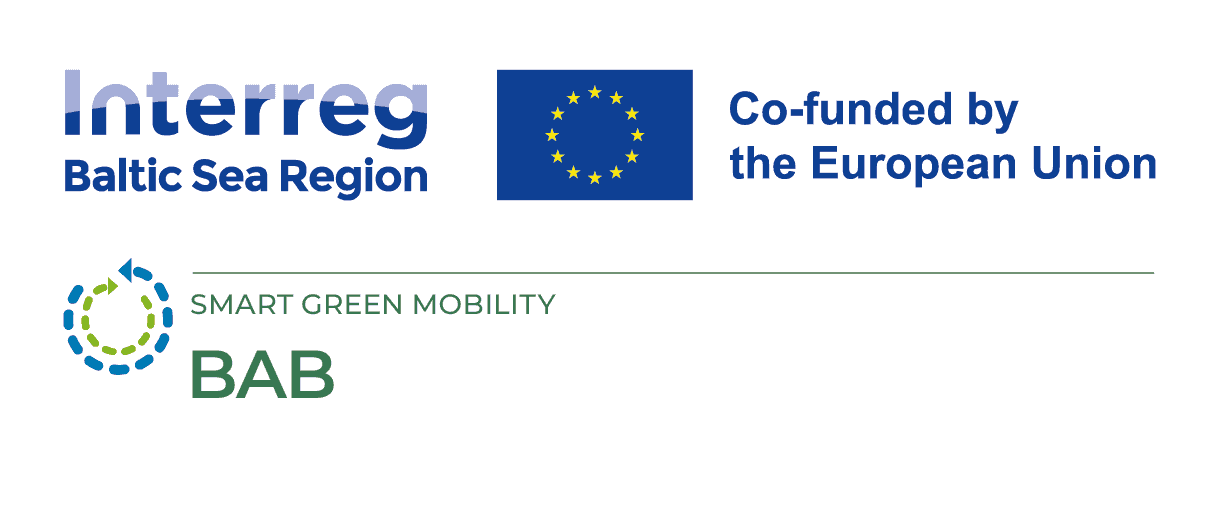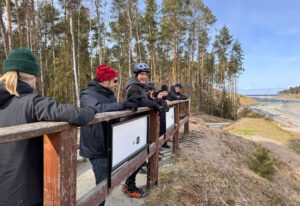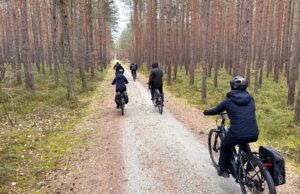
Final Partner Meeting of Bike Across the Baltic: Gdańsk, 9–10 April 2025
08 May 2025
The final partner meeting of the Bike Across the Baltic (BAB) project took place in Gdańsk from 9 to 10 April 2025. Partners from across the Baltic Sea Region met to review the project’s results, discuss the remaining activities, and explore opportunities for future collaboration in cycling tourism and mobility.
On Wednesday morning, 9 April, partners gathered at the Centrum Dolna Brama venue for internal discussions. The session focused on evaluating the BAB project’s outcomes, planning final deliverables, and addressing the sustainability of project results beyond its formal conclusion. Key areas of discussion included final reporting, dissemination efforts, and maintaining the cross-border partnerships developed during the project. The partners also explored strategies to continue promoting cycling tourism in the Baltic Sea Region using the experiences and tools developed within the project.
After a networking lunch at the Hotel Almond Restaurant, the meeting opened up to external guests for a broader discussion on cycling promotion and tourism development.
Magdalena Szymańska, representing both the Gdańsk Municipality and the Velo-City 2025 Steering Committee, introduced the highly successful Cycling May campaign. The initiative encourages schoolchildren and their families to cycle to school and work through a month-long competition with engaging rewards. Originally launched in Gdańsk, it has since been adopted by numerous cities across Poland, demonstrating how local initiatives can effectively scale to national levels. Szymańska also provided an update on the preparations for Velo-City 2025, which Gdańsk will co-host. She highlighted the importance of showcasing cycling as a tool for sustainable urban development, tourism, and climate action, inviting BAB partners to contribute their insights during the conference.
Paweł Bober from Stena Line presented the company’s increasing focus on cycling tourism. He outlined how Stena Line is adapting its ferry services to be more bike-friendly, including improved transport facilities and travel packages specifically designed for cyclists. This reflects a broader shift towards supporting active and sustainable tourism options across ferry routes in the Baltic Sea Region.
Finally, Sebastian Małyszczyk from Poland By Locals discussed practical approaches to cycling tourism from a tour operator’s perspective. He emphasised the importance of authentic local experiences, customised routes, and quality infrastructure in building successful cycling tourism offers, particularly in less-known areas.
The afternoon concluded with informal networking, followed by a group dinner at Piwna 47 Restaurant in Gdańsk’s Old Town.
Exploring Pomorskie’s Cycling Routes

On Thursday, 10 April, participants experienced one of the region’s most scenic cycling routes. The group met at Brama Wyżynna and travelled by bus to Mikoszewo to begin a 40-kilometre ride along the Vistula Spit (Mierzeja Wiślana).
Organised in cooperation with Poland By Locals, the cycling tour showcased different types of cycling infrastructure, including various surfaces, signage, and parking solutions. Along the way, the group visited several points of interest:
- Stegna Beach, a popular seaside destination,
- Sztutowo, with a stop in front of the Stutthof Museum,
- the Museum of the Vistula Lagoon in Kąty Rybackie,
- and the impressive Vistula Spit Canal.
 The ride highlighted how natural landscapes, historical sites, and well-developed infrastructure can combine to create attractive cycling tourism experiences. Discussions during the tour also touched on the challenges of route maintenance, wayfinding, and integrating local services to enhance the cycling experience.
The ride highlighted how natural landscapes, historical sites, and well-developed infrastructure can combine to create attractive cycling tourism experiences. Discussions during the tour also touched on the challenges of route maintenance, wayfinding, and integrating local services to enhance the cycling experience.
The final partner meeting in Gdańsk provided a valuable opportunity to reflect on the achievements of the Bike Across the Baltic project, strengthen networks, and share best practices with external stakeholders. As the project draws to a close, the strong cooperation established between partners offers a solid foundation for future initiatives promoting cycling tourism and sustainable travel across the Baltic Sea Region.





